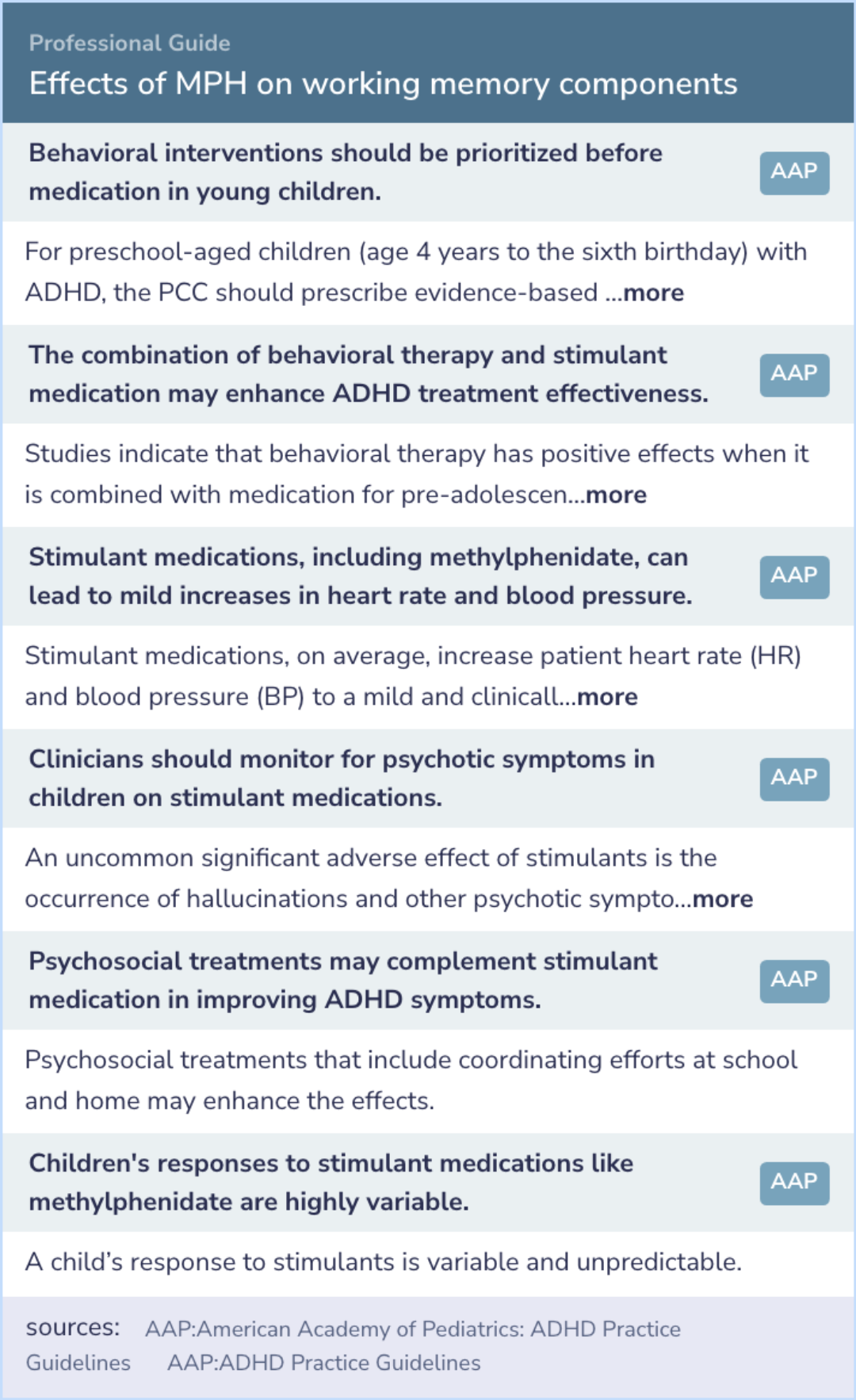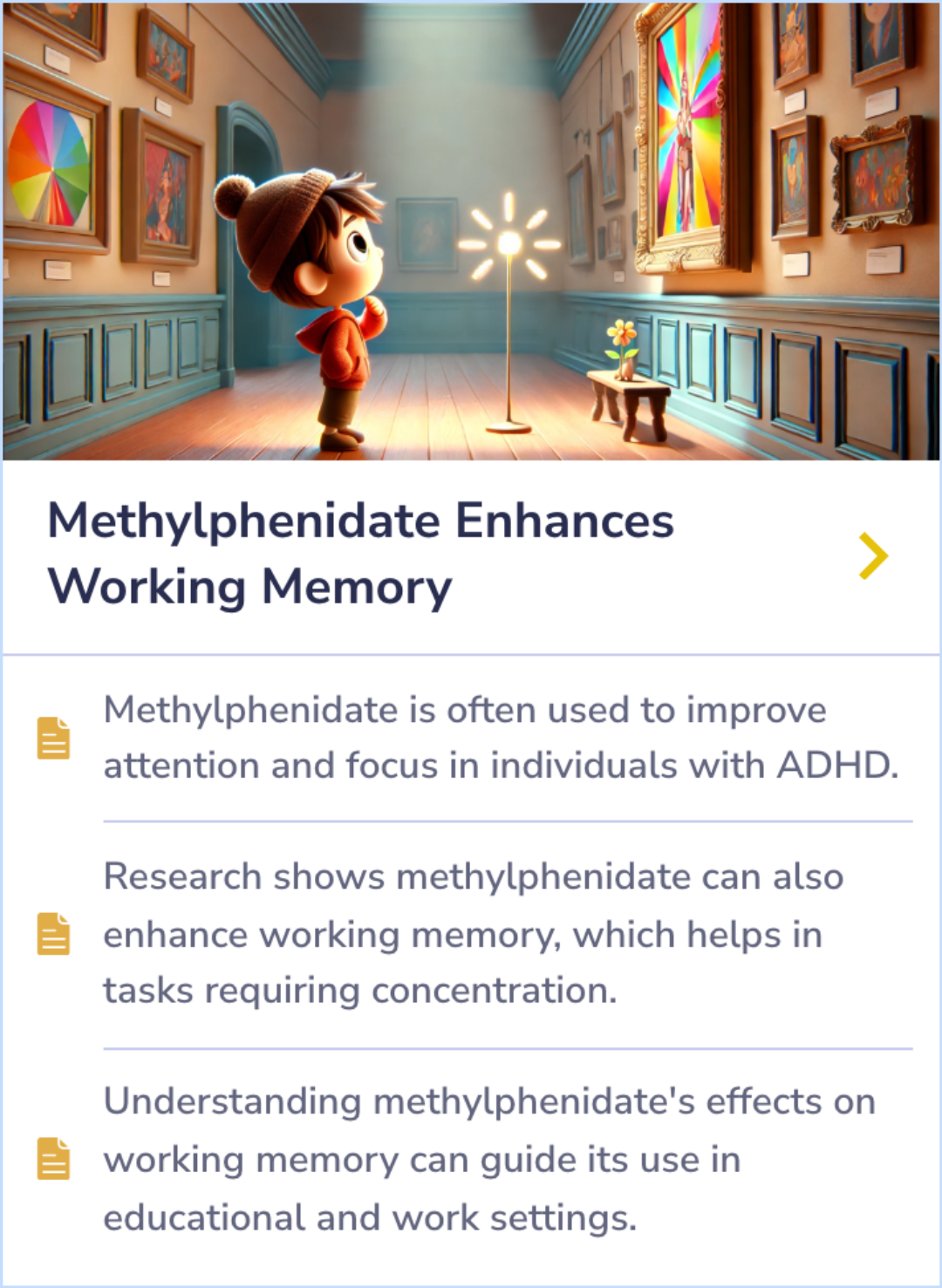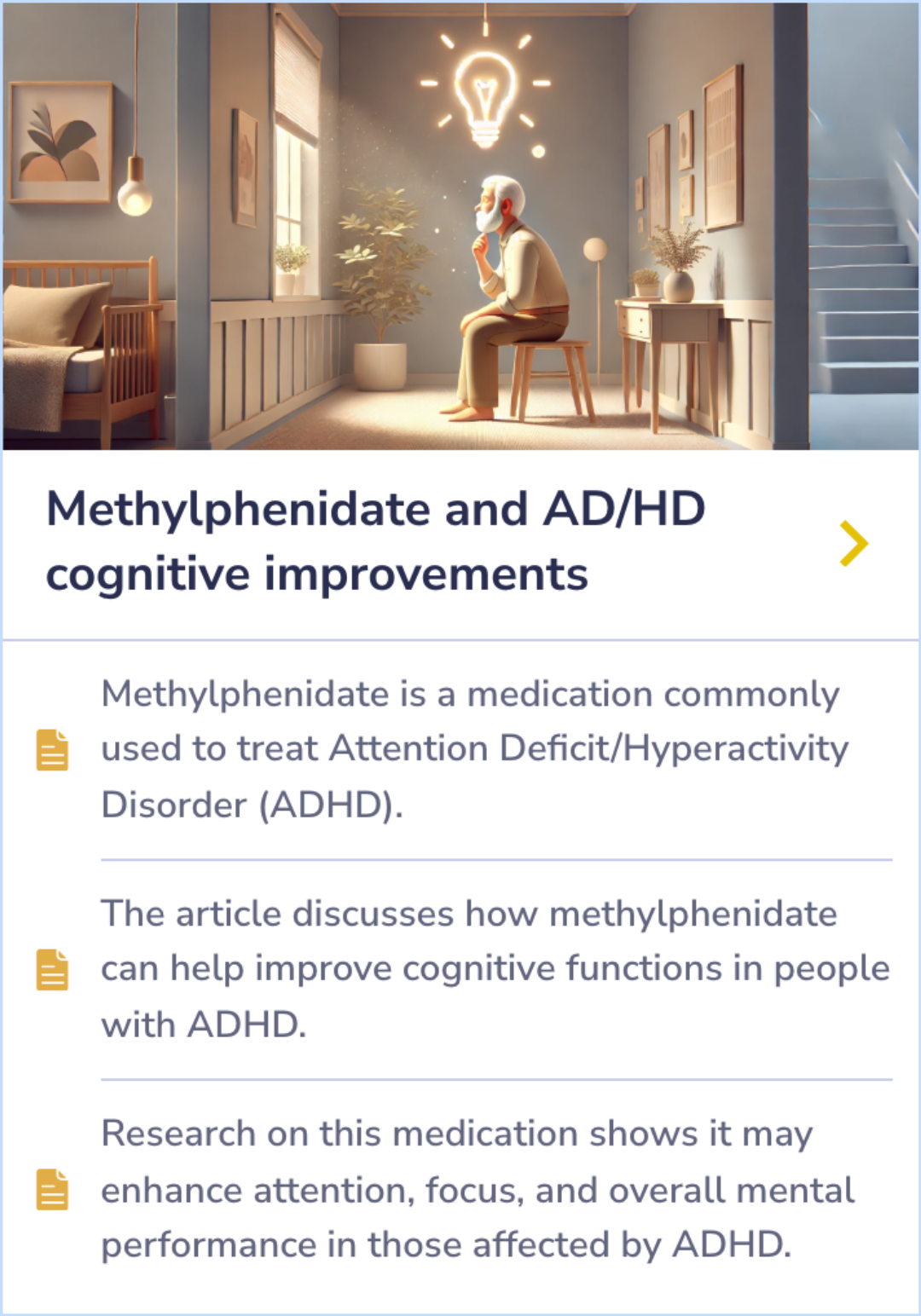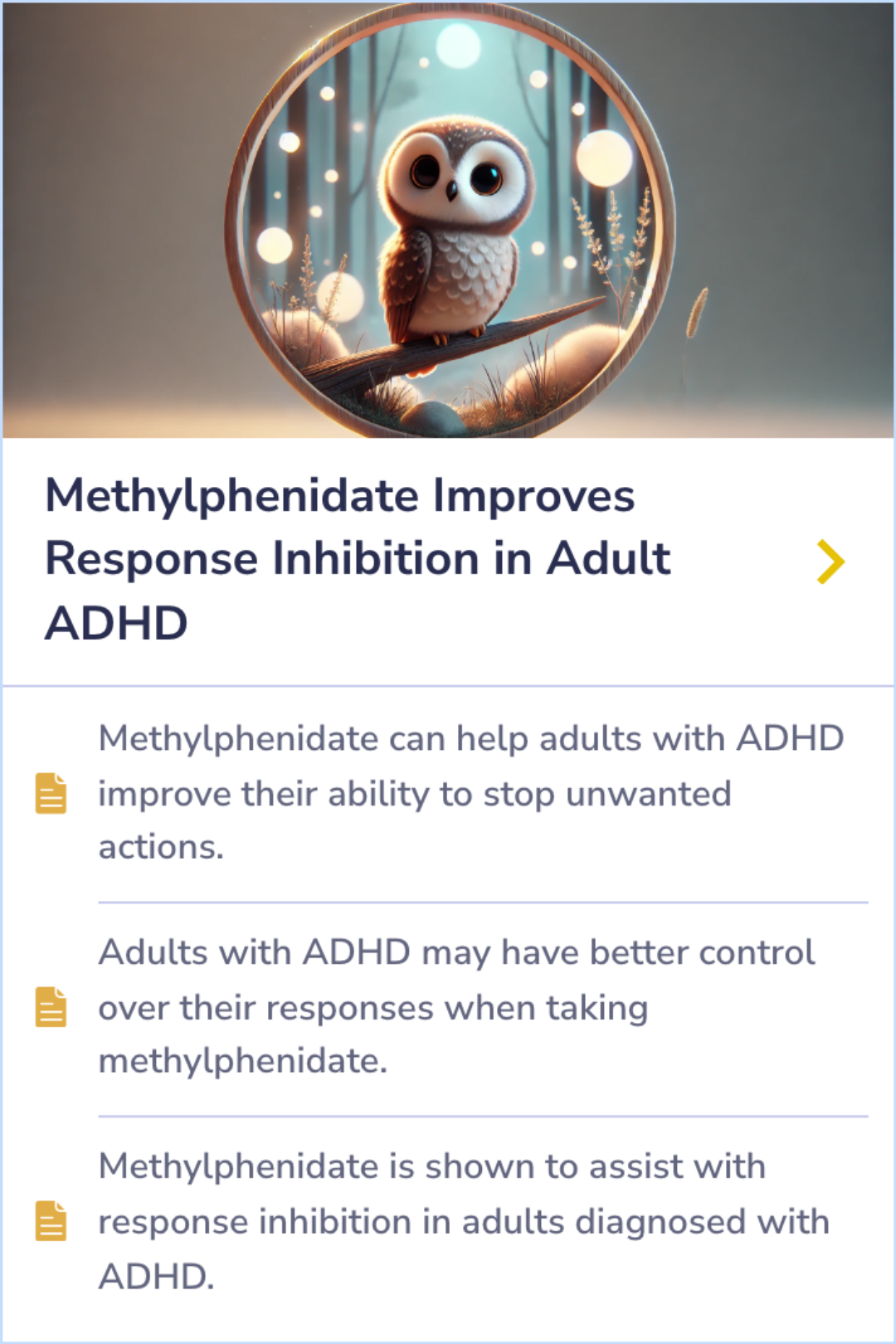Ritalin Paper Database
Visual Abstract
Effects of methylphenidate on working memory components: influence of measurement
Effects of MPH on working memory components
October 18, 2024
author
Bedard AC, Jain U, Johnson SH, Tannock R
journal
J Child Psychol Psychiatry
Date Published
2007 Sep
Why link to a visual abstract?
What is a visual abstract?
Original
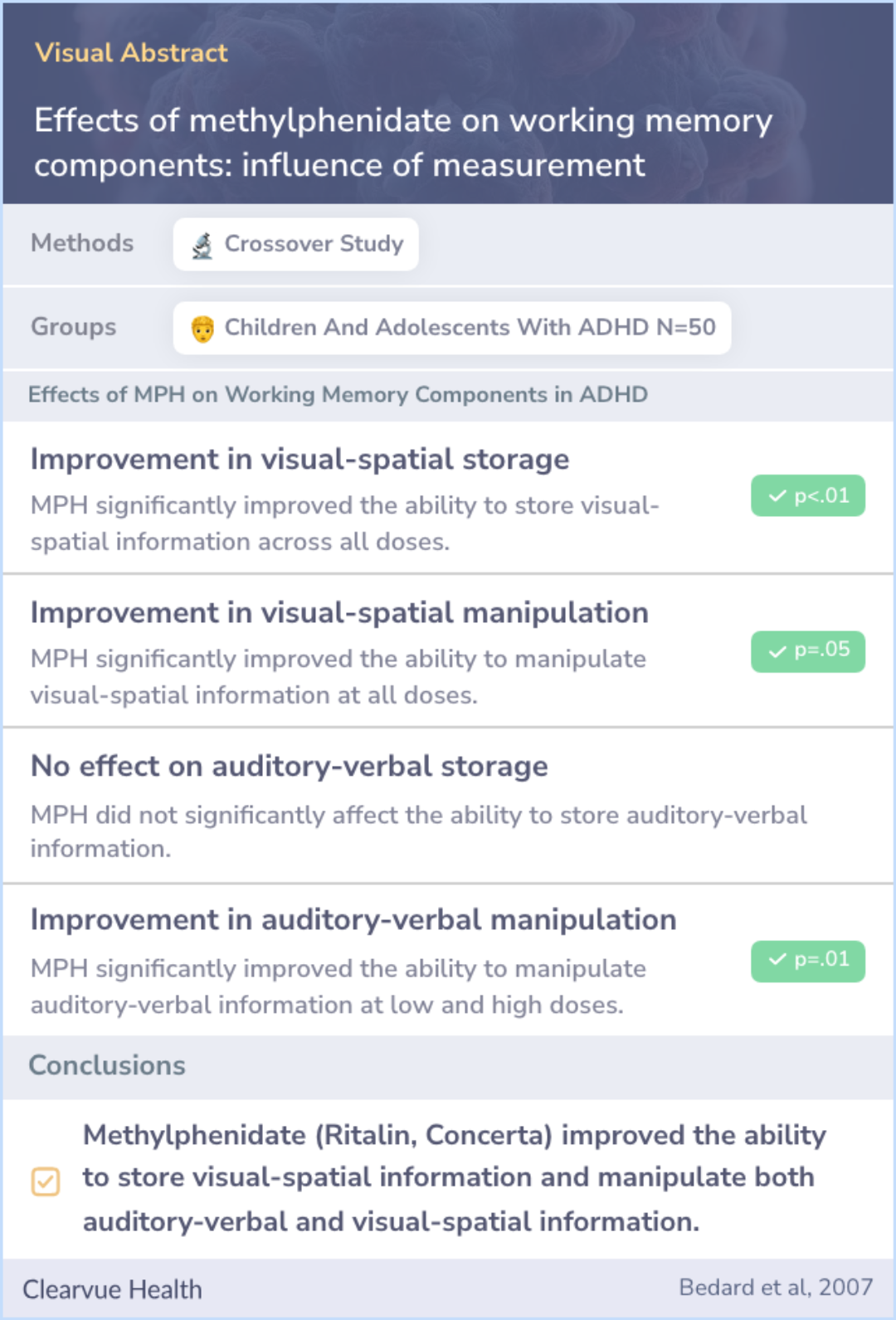
Study Summary
🔬
What They Studied
The main research question was whether methylphenidate (Ritalin, Concerta) affects different components of working memory in children and adolescents with ADHD.
💡
What They Found
The researchers found that methylphenidate (Ritalin, Concerta) improved the ability to store visual-spatial information and manipulate both auditory-verbal and visual-spatial information.
📚
What This Means
These findings align with current evidence indicating that methylphenidate (Ritalin, Concerta) is effective in treating ADHD in children and adults, particularly by enhancing certain cognitive functions.
Study Summary
Study Overview
This study explored how stimulant medication, specifically methylphenidate (MPH), affects different parts of working memory in children with ADHD. Working memory, essential for tasks like reading and decision-making, is often impaired in those with ADHD. The study is unique because it examined both visual-spatial and auditory-verbal aspects of working memory and used multiple measures to get a clear picture. The goal was to see how MPH impacts these components, which are critical for academic success.
The findings suggest that MPH has selective effects on working memory, improving certain aspects while having no impact on others. Specifically, it enhanced the ability to store visual-spatial information, which is important for tasks like reading and math. However, its effects on auditory-verbal information were less consistent. These results highlight the importance of understanding how medication can help improve cognitive functions that are crucial for children with ADHD, particularly in academic settings.
The findings suggest that MPH has selective effects on working memory, improving certain aspects while having no impact on others. Specifically, it enhanced the ability to store visual-spatial information, which is important for tasks like reading and math. However, its effects on auditory-verbal information were less consistent. These results highlight the importance of understanding how medication can help improve cognitive functions that are crucial for children with ADHD, particularly in academic settings.
Abstract: background
To investigate the effects of methylphenidate (MPH) on components of working memory (WM) in attention-deficit hyperactivity disorder (ADHD) and determine the responsiveness of WM measures to MPH.

Unique Study Design
"This is the first study to investigate stimulant effects (MPH) on the modality (AV, VS) and processing (storage, manipulation) components of WM in school-aged children with ADHD. It is also the first to use more than one measure to index each aspect of WM to determine relative sensitivity of stimulant effects."
Clinical Importance of WM Improvement
"Improving impaired WM is critical in ADHD in light of the well-documented association between poor WM and poor academic achievement in literacy, mathematics, and science."
Relevance to Academic Tasks
"This study shows that MPH enhances those aspects of WM that are typically impaired in ADHD, which is clinically important as these same WM processes are known to play a major role in academic tasks."
Study Summary
Methods
The study involved 50 children and teenagers aged 6 to 16 who have ADHD. It was designed as a randomized, double-blind (neither participants nor researchers knew who was receiving the medication), placebo-controlled (using a fake treatment for comparison), crossover trial (participants received different doses at different times).
Participants took three doses of methylphenidate, and researchers assessed four working memory components, varying in processing demands (storing vs. manipulating information) and modalities (auditory-verbal; visual-spatial). Each component was evaluated using at least two different measures to ensure thorough testing.
Participants took three doses of methylphenidate, and researchers assessed four working memory components, varying in processing demands (storing vs. manipulating information) and modalities (auditory-verbal; visual-spatial). Each component was evaluated using at least two different measures to ensure thorough testing.
Abstract: methods
Participants were a clinical sample of 50 children and adolescents with ADHD, aged 6 to 16 years old, who participated in an acute randomized, double-blind, placebo-controlled, crossover trial with single challenges of three MPH doses. Four component...more

Study Summary
Results
The study found that methylphenidate, or MPH, helped improve the participants' ability to store visual-spatial information, no matter which test was used. This means children could better hold visual and spatial details in their minds. However, it had no impact on their ability to store auditory-verbal information.
Conversely, MPH enhanced their ability to manipulate information, both auditory-verbal and visual-spatial. This improved ability to handle and process this information depended on the specific test used, showing that the medication's effects vary based on how these skills are measured.
Conversely, MPH enhanced their ability to manipulate information, both auditory-verbal and visual-spatial. This improved ability to handle and process this information depended on the specific test used, showing that the medication's effects vary based on how these skills are measured.
Abstract: results
MPH improved the ability to store visual-spatial information irrespective of instrument used, but had no effects on the storage of auditory-verbal information. By contrast, MPH enhanced the ability to manipulate both auditory-verbal and visual-spatia...more
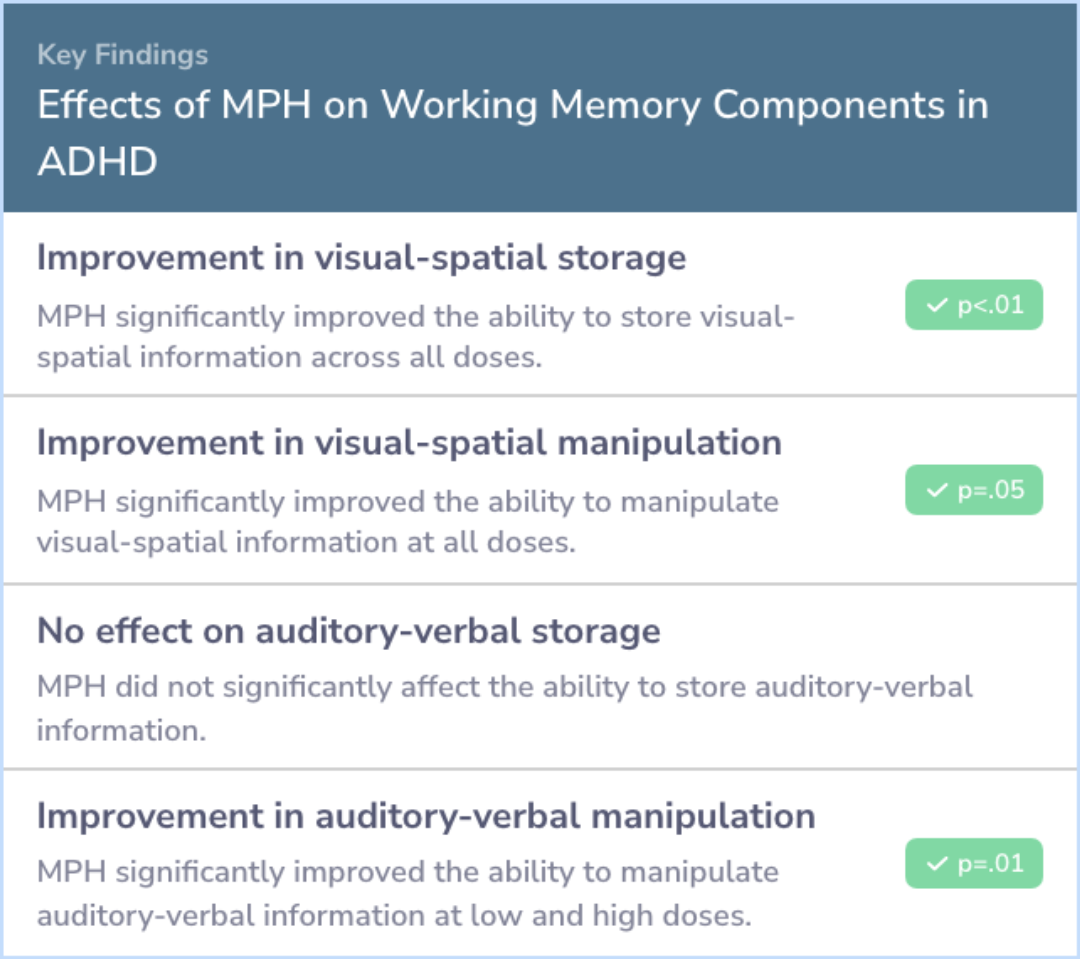
Study Summary
Conclusions
The findings suggest that the effects of methylphenidate on working memory are selective and vary depending on the component and the method used for measurement. This means that MPH does not uniformly improve all aspects of working memory but instead has specific impacts based on what type of information is being processed and how it is being tested.
Such selectivity underlines the importance of understanding the nuanced roles that different components of working memory play, and how specific medications can target these areas for children and adolescents with ADHD.
Such selectivity underlines the importance of understanding the nuanced roles that different components of working memory play, and how specific medications can target these areas for children and adolescents with ADHD.
Abstract: conclusions
MPH effects on WM are selective: they vary as a function of WM component and measurement.
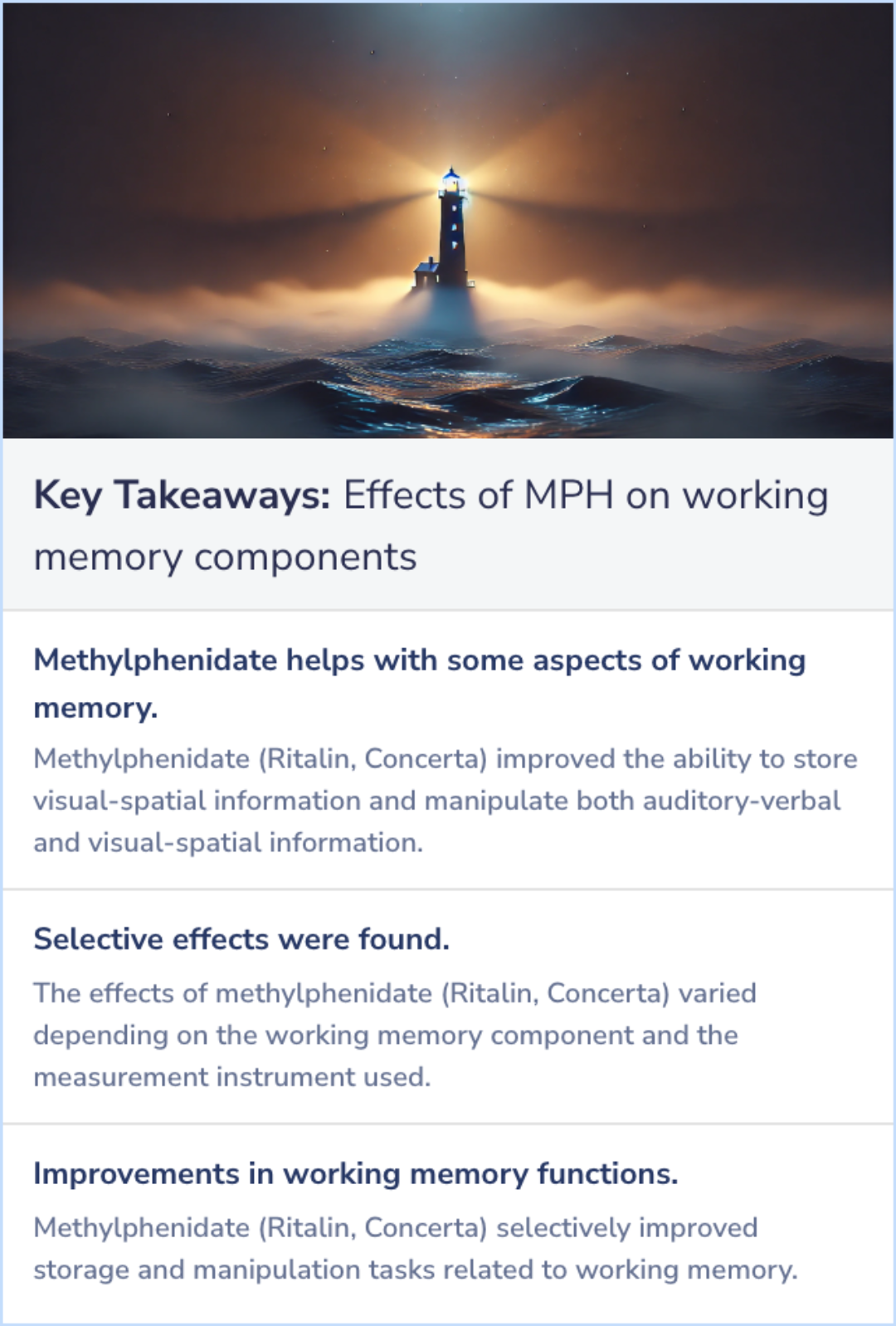
Background Information
Patient Guide
👨⚕️
Primary Uses of Methylphenidate
Methylphenidate is FDA-approved for treating ADHD in children and adults and as a second-line treatment for narcolepsy.
🧠
Action and Mechanism
Blocks the reuptake of norepinephrine and dopamine, increasing their concentration in the synaptic cleft.
💊
Available Formulations
Available in immediate-release, extended-release, sustained-release formulations, chewable tablets, solutions, and transdermal patches.
👀
Side Effects Monitoring
Regular monitoring for side effects such as cardiovascular issues, psychiatric reactions, and growth suppression is required.
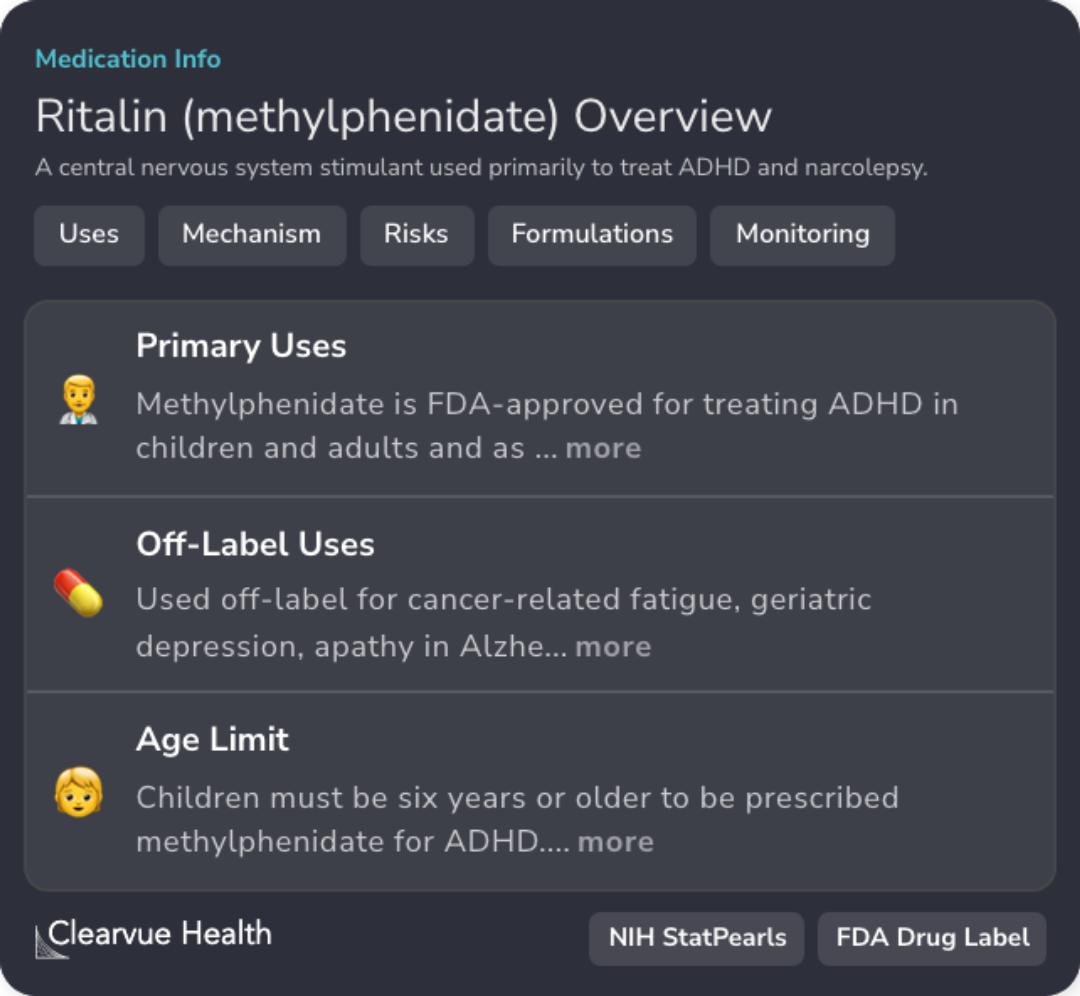
Professional Guide
Expert Opinion: Effects of MPH on working memory components
The study's findings align with current clinical guidelines on the use of methylphenidate for ADHD treatment. The American Academy of Pediatrics recommends methylphenidate as the first-line pharmacologic treatment for preschool children, due to insufficient rigorous studies on nonstimulant medications and dextroamphetamine.
Behavioral interventions should be prioritized for young children before introducing medication.
Combining behavioral therapy with stimulant medication can enhance treatment outcomes in pre-adolescent children.
Evidence also shows that younger children metabolize methylphenidate more slowly, suggesting initial lower dosing with gradual increments.
While stimulant medications can lead to mild increases in heart rate and blood pressure, these changes are generally clinically insignificant.
However, clinicians should be vigilant for rare significant adverse effects such as hallucinations and other psychotic symptoms.
Psychosocial treatments can complement stimulant medications by coordinating efforts at school and home.
Behavioral interventions should be prioritized for young children before introducing medication.
Combining behavioral therapy with stimulant medication can enhance treatment outcomes in pre-adolescent children.
Evidence also shows that younger children metabolize methylphenidate more slowly, suggesting initial lower dosing with gradual increments.
While stimulant medications can lead to mild increases in heart rate and blood pressure, these changes are generally clinically insignificant.
However, clinicians should be vigilant for rare significant adverse effects such as hallucinations and other psychotic symptoms.
Psychosocial treatments can complement stimulant medications by coordinating efforts at school and home.
Evidence Summary
Methylphenidate's Role Beyond ADHD Management
Methylphenidate, commonly used for ADHD, not only improves attention but also boosts working memory. This enhancement benefits tasks needing focus and concentration, making it practical in educational and work settings.
It is frequently used to help individuals with ADHD sustain attention and focus.
Recent research indicates that methylphenidate enhances working memory, aiding in tasks that require sustained concentration.
It is frequently used to help individuals with ADHD sustain attention and focus.
Recent research indicates that methylphenidate enhances working memory, aiding in tasks that require sustained concentration.
Evidence Summary
Enhancing Cognitive Performance in ADHD: The Role of Methylphenidate
Methylphenidate, commonly used to treat ADHD, significantly improves cognitive functions. This medication enhances attention, focus, and overall mental performance in those affected by ADHD, according to research. The article illustrates how this treatment benefits ADHD patients by boosting their ability to concentrate and perform mental tasks more effectively.
Research findings support that methylphenidate can improve the cognitive abilities of individuals with ADHD, assisting them in tackling everyday cognitive challenges more efficiently.
Research findings support that methylphenidate can improve the cognitive abilities of individuals with ADHD, assisting them in tackling everyday cognitive challenges more efficiently.
Evidence Summary
Methylphenidate Helps Control Impulsivity in Adults with ADHD
Methylphenidate aids adults with ADHD by enhancing their ability to control impulsive actions, resulting in better response management. This medication can help stop unwanted actions and improve control over reactions. Methylphenidate has shown to assist with response inhibition in adults diagnosed with ADHD.
These findings correlate with MPH's specific effects on working memory components, showing its broader impact on managing ADHD symptoms.
These findings correlate with MPH's specific effects on working memory components, showing its broader impact on managing ADHD symptoms.
